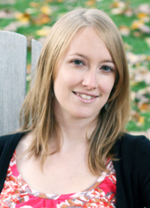Megan Olsen: Difference between revisions
From Santa Fe Institute Events Wiki
No edit summary |
No edit summary |
||
| Line 1: | Line 1: | ||
[[Image:molsen.jpg|left|150px|alt=Megan Olsen]] | [[Image:molsen.jpg|left|150px|alt=Megan Olsen]] | ||
I am currently a 5th year PhD student at the University of Massachusetts Amherst, in the [http://www.cs.umass.edu Department of Computer Science]. I work in the [http://www.binds.cs.umass.edu BINDS Lab] under the direction of [http://www.cs.umass.edu/~hava Professor Hava Siegelmann]. My undergraduate degree is also in Computer Science, from [http://www.cs.vt.edu Virginia Polytechnic Institute and State University (Virginia Tech)]. | I am currently a 5th year PhD student at the University of Massachusetts Amherst, in the [http://www.cs.umass.edu Department of Computer Science]. I work in the [http://www.binds.cs.umass.edu BINDS Lab] under the direction of [http://www.cs.umass.edu/~hava Professor Hava Siegelmann]. My undergraduate degree is also in Computer Science (with in minor in Mathematics), from [http://www.cs.vt.edu Virginia Polytechnic Institute and State University (Virginia Tech)]. | ||
'''E-mail:''' molsen@cs.umass.edu | '''E-mail:''' molsen@cs.umass.edu | ||
'''Website:''' [http://www.cs.umass.edu/~molsen http://www.cs.umass.edu/~molsen] | '''Website:''' [http://www.cs.umass.edu/~molsen http://www.cs.umass.edu/~molsen] | ||
My '''research interests''' are based in Biologically Inspired Computing and Computational Biology, and include the field of Artificial Intelligence. My research is a computational biology approach to investigate the problem of cancerous cell growth in a tissue, by using mathematical and computational models to find solutions without a laboratory. This allows discovery of new ways to look at old problems, as well as creating new questions to investigate. My approach differs from the norm in cancer research as I determine ways in which the surrounding healthy tissue cells can combat tumor cells, instead of only studying the tumor itself. To accomplish this task I combine lessons from computer science about modeling and simulating complex systems with insights from biology about how normal and cancerous cells interact. My goal is to improve both fields: provide new models of tumor growth and potential cancer treatments, and reinterpret this new knowledge to identify and combat faulty computer components that would adversely affect the complex systems they support. This naturally relates to complex systems, both because cancer is a complex system and because techniques from the field of complex systems must be used to adequately model and analyze the problem. | |||
More info on research interests, project, etc, coming soon! | More info on research interests, project, etc, coming soon! | ||
Revision as of 17:22, 22 April 2010

I am currently a 5th year PhD student at the University of Massachusetts Amherst, in the Department of Computer Science. I work in the BINDS Lab under the direction of Professor Hava Siegelmann. My undergraduate degree is also in Computer Science (with in minor in Mathematics), from Virginia Polytechnic Institute and State University (Virginia Tech).
E-mail: molsen@cs.umass.edu
Website: http://www.cs.umass.edu/~molsen
My research interests are based in Biologically Inspired Computing and Computational Biology, and include the field of Artificial Intelligence. My research is a computational biology approach to investigate the problem of cancerous cell growth in a tissue, by using mathematical and computational models to find solutions without a laboratory. This allows discovery of new ways to look at old problems, as well as creating new questions to investigate. My approach differs from the norm in cancer research as I determine ways in which the surrounding healthy tissue cells can combat tumor cells, instead of only studying the tumor itself. To accomplish this task I combine lessons from computer science about modeling and simulating complex systems with insights from biology about how normal and cancerous cells interact. My goal is to improve both fields: provide new models of tumor growth and potential cancer treatments, and reinterpret this new knowledge to identify and combat faulty computer components that would adversely affect the complex systems they support. This naturally relates to complex systems, both because cancer is a complex system and because techniques from the field of complex systems must be used to adequately model and analyze the problem.
More info on research interests, project, etc, coming soon!
